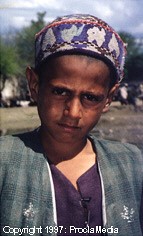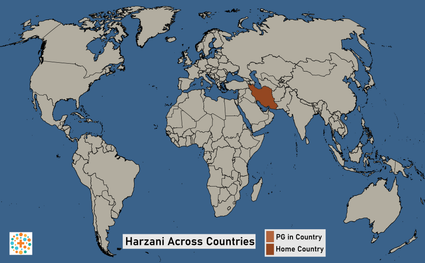The Harzani have lived in the southwest Caspian Sea region for thousands of years. They came under Turkish influence during the Middle Ages, but established their own independent khanate, or kingdom, in the 1600s.
The Harzani (Talysh) inhabit the northwestern regions of Iran. Another group can be found in southeastern Azerbaijan. They occupy a land of sharp contrasts, ranging from the high, forested Talysh Mountains to the subtropical coastal land along the Caspian Sea. They refer to themselves as the Talushon and speak an Indo-Iranian language that is also called Talysh. Although all Talysh groups have their own languages, most are also fluent in Farsi, the trade language of Iran.
The lifestyles of the five Harzani groups vary greatly due to the differences in their environments. However, regardless of the region in which they live, the majority of Talysh are farmers. In some areas, rice is the primary crop; in others, wheat and barley are grown. Tea and citrus fruits are raised in the lowlands near the Caspian Sea. Many of the Talysh living in the lowlands cultivate fresh produce, including garlic, onions, pumpkins, melons, peas and grapes.
Not all of the Harzani are farmers. Some have become skilled craftsmen. Their primary handicrafts include the production of silk, rugs and felt. Some work with tin, make shoes or design jewelry.
The Harzani live in various styles of houses, depending on the region in which they are located. Those in the mountainous areas typically live in flat-roofed homes built of uncut stone. Those in the coastal zone live in clay houses that have roofs made of reeds or sedge (grass-like plants with solid stems). The homes usually have high doors reaching to the ceiling, since there is no opening in the roof to allow smoke from the cooking fires to escape. The traditional Harzani homes have no furniture. However, today, a growing number of homes have adopted Western-style furnishings.
Although Islamic law permits men to have as many as four wives, most Harzani men take only one wife. Boys usually marry while they are between the ages of 15 and 20; whereas, girls usually wed while they are between the ages of 12 and 16. The groom's family is required to pay a bride-price, or kebin, which consists of money and items such as carpets or utensils. To avoid paying the kebin, a young man will sometimes "kidnap" the prospective bride, taking her as his wife.
The Harzani are virtually all Shia Muslim like the Iranian majority. They consider Jesus to be a prophet, a teacher and a good man, but not the one who's death is the only way to eternal salvation.
Since Islam is a religion of works, they believe that after death they will be judged by their good deeds and by their knowledge of the Koran. Like other Muslims, they observe the five "pillars" of Islam, which include affirming that Allah is the only god and Mohammed is his prophet, praying five times a day, giving alms generously, fasting and making a pilgrimage to Mecca.
Although the Harzani are professing Muslims, some remnants of their pre-Islamic religion remain. For example, they have a great reverence for trees and groves, and trees form some of their most sacred sites. They also believe in the presence of both good and evil spirits, with the most dangerous spirit being Alazhan, the "Red Woman." Alazhan is believed to attack women during childbirth as well as newborn babies.
Iran has strictly enforced the "Islamic code of conduct" since the 1979 revolution. This code states that men are the leaders and women care for the children and home. The government's persecution of Christians has increased dramatically since the revolution.
The Harzani have been followers of Islam for many years. Most of them have not had an opportunity to hear a clear presentation of the gospel. These precious people are in desperate need of Christian resources in their own language. Willing laborers and evangelistic tools are needed to effectively reach these groups with the light of the gospel.
Pray for the Lord to send dreams and visions to Harzani elders and family leaders.
Pray that God will send medical teams and humanitarian aid workers to minister to the needs of the Harzani.
Ask God to raise up workers to translate Christian materials into Harzani.
Pray there will soon come a day when Harzani disciples will disciple others.
Scripture Prayers for the Harzani in Iran.
https://www.iranchamber.com/people/articles/iranian_ethnic_groups.php
https://www.wikiwand.com/en/articles/Harzani
| Profile Source: Joshua Project |











